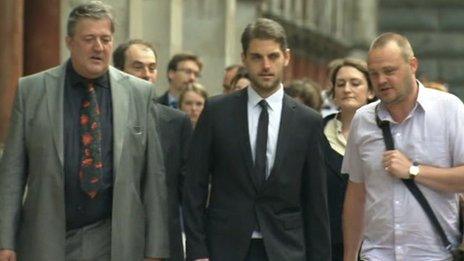Paul Chambers 'blow up' airport tweet appeal judgement reserved
- Published

Judgement has been reserved in the appeal of a man who was found guilty of posting a comment on Twitter threatening to blow up an airport.
Paul Chambers, 27, from Doncaster, who now lives in Northern Ireland, was convicted in May 2011 of sending a "menacing electronic communication".
He claimed it was a joke and wants his conviction and sentence quashed.
Comedian Stephen Fry, who was at the High Court hearing, said it was "very important" for freedom of speech.
The judgement was reserved until a later date.
Mr Chambers said he had sent the tweet, which contained swear words, to his 600 followers in a moment of frustration after Robin Hood Airport in South Yorkshire was closed by snow in January 2010.
He said he had never thought anyone would take his "silly joke" seriously.
The message Chambers tweeted stated: "Crap! Robin Hood airport is closed. You've got a week and a bit to get your shit together, otherwise I'm blowing the airport sky high!!"
Legal 'steamroller'
He was found guilty by Doncaster magistrates in May 2010, fined £385 and ordered to pay £600 costs.
An appeal was dismissed in November 2010 with a Crown court judge stating that the electronic communication was "clearly menacing" and that airport staff were sufficiently concerned to report it.
His lawyers have claimed he was the victim of a legal "steamroller" that threatened to make the law look silly and that the Crown court erred in law and in common sense.
John Cooper QC, representing Chambers at the High Court, argued that even if the message was a threat, it could not be defined as menacing or criminal.
Comedian Al Murray came to court to support Mr Chambers, saying it was ridiculous to convict him of something that was a joke.
He told the High Court hearing: "We don't say it's a good joke but he shouldn't have been convicted over a bad one.
"At worst, the tweet was offensive."
Mr Cooper said for a message to be considered menacing, the person sending the message must intend to threaten the recipient and it has to contain a credible threat.
During the hearing, Mr Cooper was challenged by one of the judges on whether there was a genuine freedom of speech argument in the case.
The QC said that freedom of speech was not just there to protect the righteous but to protect the unpleasant too.
Among Mr Chambers' supporters at the hearing were Stephen Fry and comedian Al Murray.
Mr Murray said he was there because he had found the conviction "monstrously unjust".
He said: "[Mr Chambers] made a throwaway remark and the law has lumbered into horrendous action.
"It astounds me that anyone found this threatening."
- Published28 May 2012
- Published8 February 2012